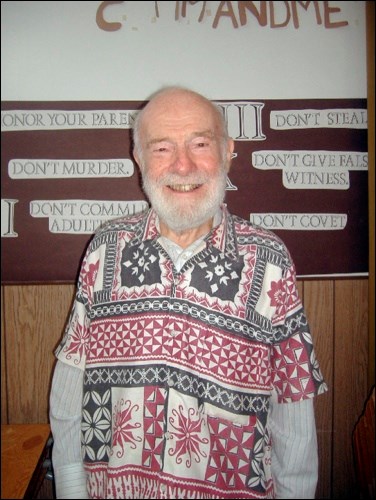Although Lex Rutherford is in his 80s, he is actively helping small farmers in Kenya dig water wells.
Rutherford, who was originally from the Neilburg area, came home and shared some of his vision at the Neilburg/Marsden United Church May 1.
When Rutherford travelled toKenya, he noted,"one very obvious event in every family, daily, was locating and carrying water. This involved the women (mostly), going long distances to small streams and pools, dipping and pouring into 20 litre jerry cans. The water places were polluted, some very murky, and shared with livestock and wild animals. They carried the jerry cans on their backs."
He also noted the devastating effects when the rainy season was too short and severe drought conditions followed. Non-government organizations were trying to help with various "production oriented projects. Many such projects left traces of their unsuccessfulness - with dried up vegetable gardens, dead gardens and tree planting nurseries, cows giving very little milk and suffering (even dying) from liver flukes - all due to the lack of pure water."
Rutherford's assessment was that no farm "project" in Africa would be successful without a perennial source of water. Deep bore-hole wells were not the answer. They had to be dug to great depths, were difficult to pump, women still had to carry the water many kilomeres, the water had to be paid for and watering gardens was not allowed.
Over time, he began to develop a strategy to see water wells dug on the many small farms in Kenya. Some of the farms are only a quarter or a half of an acre. Rutherford said, "there are water streams beneath every small farm and that wells can be dug to find a perennial water stream at no cost."
He has helped train community leaders to use "bent wire water finders" to locate these water streams. They have kept detailed records, making predictions of how deep the farmers would have to dig to find water and then later recording at what level it was actually discovered.
Rutherford's group, which is known as SWIM (Shallow Well International Movement) shares the idea of organic farming and he encourages the idea of having a 365-day garden.
Rutherford saw the need and wasn't sure how to make a difference, so he began to pray for wisdom. He said his prayer was answered when "using my hands, the Lord made 'bent wire water finders' out of two clothes-hangers. More enlightenment was added with the ability to use the wires to predict 'how deep to dig' to a stream and 'how many feet of water' would be in the cistern of the well. Each foot of a 36-inch diameter well contains 200 litres of water. In five feet, they usually find 1000 litres."
Rutherford says, "what started with a few farmers digging became SWIM, and by 2008 was satisfying over 30,000 farmers totally, and three times that many neighbours who are invited to use those wells until they dig their own. The digging goes on beyond our knowledge as farmer's move around Kenya voluntarily sharing the good news."
The present plan is to continue encouraging the movement. Rutherford estimates at least a million wells are needed in Kenya. His vision for Equatorial African is to have shallow wells on small farms within 20 degrees on both sides of equator. This could ultimately involve 20 to 25 different countries, and the movement could move beyond the 20 degree margin.
According to Rutherford's record, about 99.99 per cent of the well digging is successful.
"All of my hopes and aspirations are being fulfilled," he says. "The endeavour is in the hands of the Kenyan farmers and they are doing well. Thousands of shallow wells are being dug."




